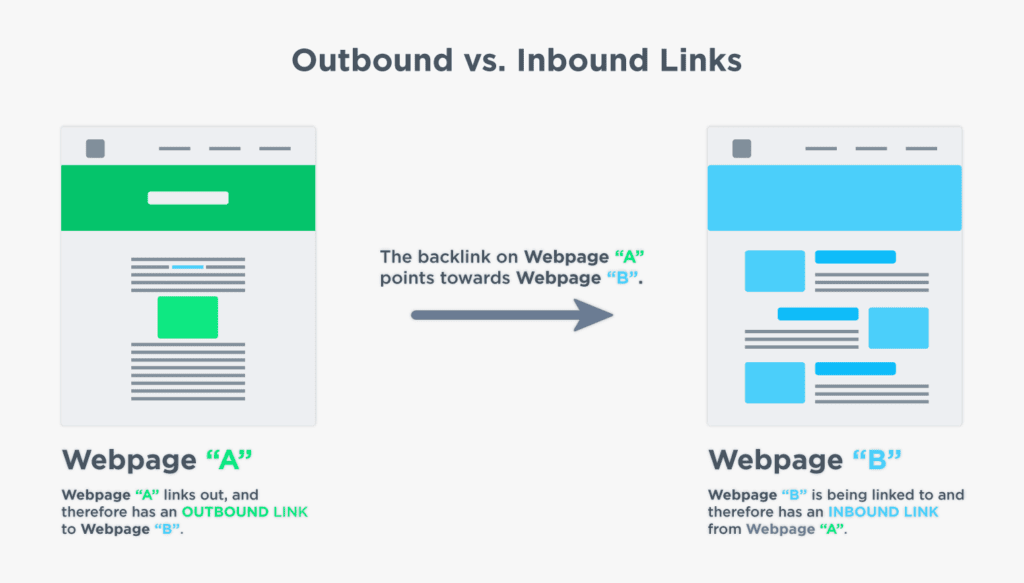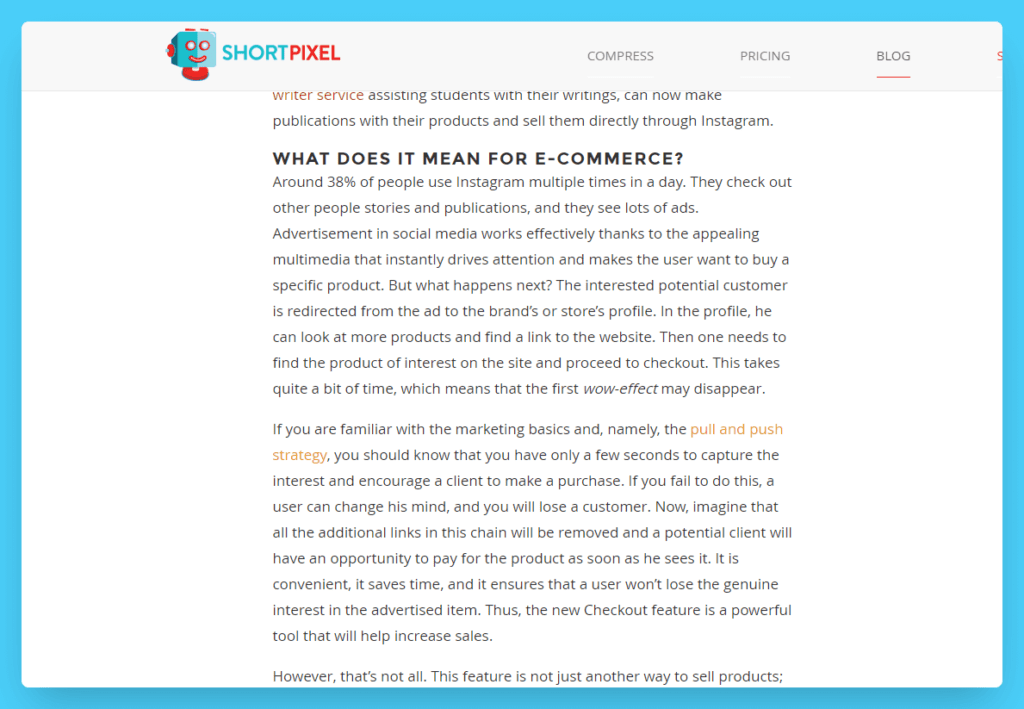If you have just the slightest experience in SEO, you know backlinks matter. It’s no secret that receiving and giving links can help you rank higher. Today we’ll look at exactly how that happens by explaining inbound and outbound links and their differences.
Both inbound and outbound links are important for SEO because they improve the user experience and provide additional context to Google. The first part of that equation, the user experience, matters because hyperlinks are how users navigate the web. Without them, users virtually cannot find and visit other pages.
The second part has to do with Google’s proprietary algorithms. Google needs a way to judge the quality of each web page before it shows it to users. For this, Google decided to use a more objective measurement as one of the primary signals: external “votes of trust.” Those external votes of trust are similar to how citations work in a scientific environment – but in the case of the internet, the signals are simply hyperlinks.
Over the years, both of these factors have somewhat merged. Both inbound and outbound links that provide a good user experience are generally regarded as good links by Google.
For example, a well-placed, contextually relevant outbound link can prompt users to learn more about the subject you’re covering in your content. From Google’s perspective, this explains (or at least hints) why you link to that specific piece of content of all the rest on the same topic. Similarly, links to your website from other websites (i.e., inbound links) inform Google that your content stands out in some way.
In both scenarios, the anchor text – the clickable words you use in the link – gives Google great insight into why users should go to that other page. Additionally, the text surrounding the anchor text (some SEOs even say the whole paragraph itself) also gives Google insight into what specific value the linked page brings.
This helps Google in yet another way. Correlating anchor texts to the content allows Google to easily spot backlink schemes trying to game the system.
Following that logic, a link that says “click here” is worth less than a link with anchor text like “an SEO study by Morningscore.” Because of that, the best inbound and outbound links provide context around the link itself.
What is the difference between inbound and outbound links?
Although they sound similar, inbound and outbound links have some differences. While both of these links are regular backlinks, the thing that determines whether a link is inbound or outbound is the website in question. Let me elaborate.
As a general rule, both inbound and outbound links share a portion of the origin website’s authority with the destination website. Inbound links are all your backlinks from other websites, and they bring you more authority. Meanwhile, outbound links share your page’s authority with other pages.
The difference between inbound and outbound links lies in their functionality and their effect. Both of these types of links work like any regular backlinks. They pass authority between websites, given that they are dofollow. However, functionality-wise they differ in where the backlink is placed (i.e., the origin) and where it links to (i.e., the destination).
Inbound links are all your backlinks from other websites. Generally, they bring your website more authority, shared by the origin website that links to you. On the other hand, outbound links are all backlinks you create on your website, pointing to pages on other websites. Because in this case, your website is the origin, you share a portion of your page’s authority with the destination website.
The difference lies in how authority (also known as PageRank value) flows through each website involved. When you receive an inbound link, the PageRank value from the website that links to you is passed to your page. From there, it increases the value of your page so that it has a higher chance of ranking in Google.
Meanwhile, outbound links pass link equity from your pages to the linked page on the other website. Similar to how other web pages transfer their link equity to your web page, your web page sends a portion of its collective authority out to other pages. Fortunately, this system is well-thought-out. Your pages do not lose link equity by linking out to other pages but instead can gain more momentum.
Are inbound and outbound links the same?
While inbound and outbound links refer to backlinks (i.e., hyperlinks), they do not refer to the same type of link. The term “inbound links” refers to all backlinks pointing from other websites to your website. In contrast, “outbound links” are all hyperlinks pointing from your website to other websites. In general, an inbound link for one site is an outbound link for the linking website.
To determine whether a link is inbound or outbound, you need to consider the link’s point of reference (the direction). If you’re looking for inbound links, you’re generally looking for links pointing toward a given website or web page.
Meanwhile, suppose you’re trying to find a website’s outbound links. In that case, you’ll look for all hyperlinks pointing outwards from the website in question.
To understand this, imagine the relationship between two websites, where one of the sites links to the other. If we set our reference point as the linking website, we can determine the link to be outbound. In contrast, if our reference point is the linked website, then the link is inbound. Here is an example of that backlink relationship for the two websites visualized:

As you can see in the example above, the backlink created on webpage “A” points out toward webpage “B.” That link is an outbound link for web page “A” because it goes out of their website. However, for webpage “B,” that link is an inbound link – since it’s coming in from another website.
Links that are bound inwards to your website are called “inbound,” and links that are bound outwards of your website are called “outbound.” Inbound links are basically what you want to get to gain authority in Google’s eyes, and are these you want to track using a link tool.
Understanding inbound links
As we established, inbound links are all the links that point from other websites to your website. Inbound links are also known as backlinks. They are generally one of the strongest ranking factors for Google, especially when they are high-quality.
Inbound links are all incoming backlinks from other pages on other websites toward pages on your website. Generally, inbound links work like “votes of trust” that distribute authority between websites. High-quality inbound links are among the strongest ranking factors for off-page SEO.
Generally, you can think of the term inbound as something that points inwards towards something else. That is to say; when we mention inbound links, it’s important to set a point of reference.
Inbound link example:
Let’s quickly look at a real example of an inbound link. To keep things easy to understand, I’ll show you one of the inbound links we at Morningscore have received from the website shortpixel.com, where they reference us on their page.

As you can see, they have linked to one of our resources called “Push vs. Pull Marketing” through their content. This immediately makes the link on their website “inbound” to us. The link is no different from any other backlinks you might have received pointing to your website.
Understanding outbound links
Outbound links are all the hyperlinks on your website that point to pages on other websites. These links are also important for Google because they signify trust in the content you link out to.
Outbound links are all backlinks present on pages on your website that point to pages on other websites. Generally, outbound links work like “votes of trust” that share a portion of your website’s authority with the destination website. Linking out to high-quality pages can help you rank higher.
Because outbound links are backlinks pointing from your website to other websites, it means that you are sharing your page’s authority with other web pages. Your page’s authority is distributed across the outbound links in your article, and they benefit from it. So for example this outbound link to Tekpon will benefit them
Outbound link example:
To understand outbound links better, let’s look at a real-life example. And to keep things simple, we’ll look at the very same example as for inbound links – however, denoting the details around outbound links.

We can say that the very link from above is also outbound for the website that linked to us. When a site links to a page that is not part of its domain, the link is immediately considered to be “outbound.”
As you can see, the difference between inbound and outbound links can technically be the reference point of the origin and destination websites. The relationship between any two websites shows that the linking site has an outbound link and the linked site has an inbound link.
How do inbound and outbound links help SEO?
If you have even the slightest experience with SEO, you know that backlinks matter. They help you get more visibility, traffic, and customers. Backlinks help you rank higher by showing search engines that your pages are authoritative and relevant to the user’s search query.
In general, high-quality inbound links help SEO by transferring authority from the origin website to the destination website. Outbound links to high-quality pages help SEO by signaling higher relevance and usefulness. Inbound and outbound links signal the relevance and authoritativeness of a page.
A page with many high-quality inbound links signals to Google that many other website owners are interested in this website’s content. It is a showcase that the content is valuable and trustworthy and deserves a recommendation. Because it is hard to high-quality earn inbound links, search engines naturally reward you more for having those. While some medium-quality inbound links can also help you build momentum, it’s usually a good idea to avoid low-quality inbound backlinks.
On the other hand, outbound links help SEO by signaling to search engines that you have put in work to turn your web page into as good of a resource as possible. In other words, it is your contribution to a better internet. By inserting highly contextual and relevant outbound links to your articles, you help the user understand the topic better. Additionally, outbound links help you back up your arguments and add substance to them. Outbound links can also build trust and even relationships with other businesses – which can ultimately be favorable for both of you in the long term.
Do inbound links and outbound links help SEO equally as much?
Having both inbound and outbound links on a website is normal and beneficial to your SEO. However, inbound links are ultimately the more important factor for ranking well. That’s because having inbound links means that other websites are passing their website’s authority (PageRank) onto your website.
As a general rule, inbound links help your SEO to a greater extent than outbound links. Both link types are useful for SEO, but inbound links are direct signals that other websites find your content valuable. Meanwhile, outbound links hint that you present high-quality content to your readers.
For both inbound and outbound links, it’s important to look at the website’s authority. A set of studies by Perficient confirms that inbound links do, in fact, help rankings. However, the study also showcases that it’s not all about how many backlinks you have – but rather their quality. In other words, fewer backlinks from more authoritative websites are more beneficial to rankings than many low-quality backlinks.
For outbound links, the website’s authoritativeness is a representation of trust. While outbound links are great for the User Experience, they aren’t necessarily a make-or-break ranking factor. Although a few studies have shown a correlation between ranking well in search engines and outbound links, they are not a top factor. In other words, outbound links might ultimately help your SEO by signaling trust when you link out to other high-quality resources.












